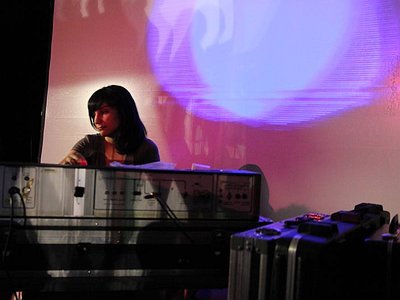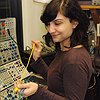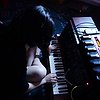Part 3
What's your view on the role and function of music as well as the (e.g. political/social/creative) tasks of artists today - and how do you try to meet these goals in your work?
In many aspects of life, I’m something of a practicing hedonist. I don’t really aim to make art that serves any purpose beyond that of an aesthetic one. That being said, however, my understanding of that which constitutes an aesthetic experience might, perhaps, be a bit looser than that of the average person, as I regard it to be as much somatic or sensual as intellectual and phenomenological. I don’t deliberately incorporate political or social commentary into anything that I do. But that’s just me; that’s not how I’d want to say things of that sort. With regard to my own practice, I think minimalist music (well, most of it) had it right: the focus should, at least some of the time, be on the sound itself and not on its function as some sort of obvious object of equipment. I’m not saying that all music aside from Feldman’s late piano works ought to be abolished; just that there should be ample space for this type of experience along with everything else, which does not seem to me to necessarily be the popular view. If there is a greater project at work that I reach for in my own experience of consuming music, it’s a decidedly lofty one concerned with traversing that path between the desperate psychological need to articulate and quantify and the desperate emotional need to simply feel the inexpressible nature of things. A lot of my views regarding the role of art more generally have been informed by mid-century Continental philosophy and, specifically, the writings of Maurice Merleau-Ponty, aka the only man who has ever really understood me. As far as I can tell, he’s one of only a few humans who have come close to describing the unique state of being a fleshy, thinking, feeling thing in this world and he does so with a sense of awe and wonder, rendering very singular micro-experiences or conscious moments as being particularly meaningful. I think art, whether implicitly or not, should attempt to take us back to these mental and physical places, and, more importantly, to also project us into new ones. I don’t know, I probably didn’t explain that well and maybe sound like a jerk.
Listening is also an active, rather than just a passive process. How do you see the role of the listener in the musical communication process?
I think that music is more about listening than it is about anything else; even in the composer or performer role, I would argue that your ability to listen is just as, if not more important than your subsequent ability to recognize and execute or follow through. That being said, I think that there are actually a lot of times where it’s appropriate and necessary to just hear things and let them pass over you instead of listen intently. That can be a bit frustrating if you’re really trying to communicate something specific, but mostly it’s pretty wonderful if you’re just doing your thing and hoping that other people pick up on it and connect in some way. The composer is a listener as much as anyone else; they just also happen to be the person who is in the position to tweak things to suit their desired experience. When you choose to listen to music in headphones while walking or through speakers in your bedroom or while driving in your car or whatever, you are, in a sense, shaping the communicative process in a similar way.
Reaching audiences usually involves reaching out to the press and possibly working with a PR company. What's your perspective on the promo system? In which way do music journalism and PR companies change the way music is perceived by the public?
I feel too removed from the whole PR process to really give an informed or useful opinion. I don’t do a lot of my own promotion and am fairly reliant on subsidiary PR sources or labels to help me out. Music journalism can really be a wonderful tool but it can also be very destructive and problematic when it misses the point. Let’s just say that when you’re a young woman who totes around revered cultural objects, you’re bound to get attention that has absolutely nothing to do with the actual quality and nature of the sounds that you make. I’m also finding that a lot of the literature regarding drone and ambient music seems to be coming from a position of implied opposition, and I’m not really sure why that’s the case. I don’t know, I guess journalism is the one aspect in which I feel I’ve already become jaded. That being said, I’ve been fortunate to receive a lot of positive promotion from highly considerate and creative individuals, and that’s been really encouraging and valuable.
Do you have a musical vision that you haven't been able to realise for technical or financial reasons – or an idea of what music itself could be beyond its current form?
As a part of my master’s thesis, I composed a piece for fixed electronics and live pipe organ and I got to perform it in this beautiful circular chapel with floor-to-ceiling windows and a skylight. It was amazing. I’ve wanted since then to do a tour of Europe performing only in churches and cathedrals with a similar set up. Also, legend has it that there’s an abandoned outdoor polar bear enclosure made of concrete in Stanley Park, which is this stately old-growth forest that sits on the edge of downtown Vancouver overlooking the ocean. I’d love to project some tones there, too, one day, if only for the trees.
Please recommend two artists to our readers which you feel deserve their attention.
Ezra Buchla is a Los Angeles-based musician who has drifted under the radar slightly as a solo artist, better known perhaps as a founding member of the Mae Shi and as a contributor to the projects of Carla Bozulich and Chelsea Wolfe. In recent years, though, he has made some of his compositions and songs available online and it truly is some of the most beautiful and intense music I’ve heard in these mad times. Written primarily for computer/electronics, viola, and voice, akin in texture and quality to Mirrorwork/Cry-era Alastair Galbraith. I’m not quite sure how to put it into words, exactly, but there’s this kind of startling or jarring and disjointed aspect to his music that oddly makes you feel really at ease and sort of mentally clean. To boot, Ezra’s also a super sweet human.
Ernstalbrecht Stiebler is by no means a new composer, but he’s one of my most revered and I find it troubling that his oeuvre is so little known. I don’t even remember how I came across his music initially, so there you go. Stiebler was born in Berlin in 1934 and has been composing super minimal orchestral, chamber, organ, and sometimes electronic music since the 1960s, following brief studies with Herr Stockhausen at Darmstadt in the late 1950s. I’m not so fond of his earlier stuff--I think he really hit his stride in the early 1980s, and the pieces he’s composed this side of the millennial divide are particularly incredible. He works a lot with microtones and droning textures, merging the delicacy of Alvin Lucier and the intricacy of Phill Niblock. His works for strings – cello especially – are among my most admired. Sequenz II for solo detuned cello and tape, for instance, is somehow simultaneously consonant and dissonant at every moment and it’s flawless. Some of his music is hard to suss precisely by ear, which makes it a fairly out there listening experience. May this octogenarian zeigen Ihnen den Weg, too.
If you enjoyed this interview with Sarah Davachi, you can find out more about her work by visiting her website.







